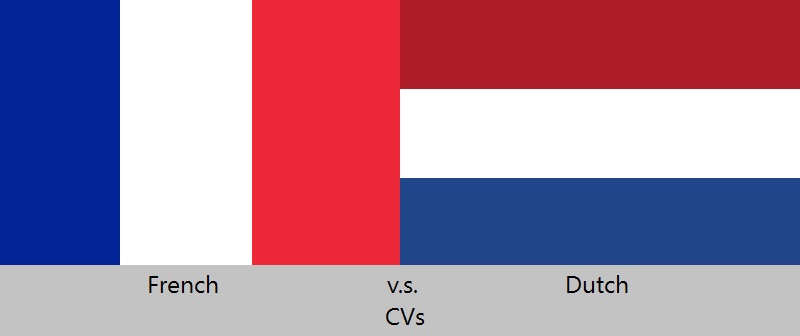
1. Personal details
In a typical French resume, about ¼ of the page is taken by personal details and their picture. by personal details, I am referring to name, date of birth, and contact details. However, French candidates have the tendency to TOO much information in our eyes: age, sex, state of marriage, kids, etc. While this may be needed in france, the Dutch CV doesn’t require it. Moreover, we find it extremely strange when a person mentions who they are married to and how old his kids are. All we need to know is you full address/phone number/email and preferably skype. You can mention your nationality, though if you come from non-EU country, you should mention it right away, and your work permit status. In The Netherlands we also prefer to see the title of your CV, not just your name. Giving your CV a title simplifies the work of a recruiter. To save the space on the first page of the CV, put your personal details in the header!
Also, it is important to use neutral and professional email address and skype details! Your name and last name work the best, If you start using details like: olga.marketing or olga@marketing.me could give a wrong impression to a recruiter. It’s is better to give the CV a professional title rather than using your social accounts and email. Let’s be honest, your life is not only about Marketing, Right?
Let’s move on to the following part – in my eyes the most crucial part of the CV: your personal profile.
2. Personal profile
Very few candidates know that recruiters screen a CV for only 7 seconds at a maximum. From this quick briefing of a profile, they know if it’s match and if it worth investing more time in reading the CV further. So you need to brand yourself efficiently and correctly! A dutch CV usually contains a combination of experience and skills relative for the position.
3. Size
A traditional Dutch CV has 2 pages. There’s a tendency nowadays to create 1 page Cvs. However, it’s very difficult to show all the relevant experience on 1 page CV. Unless you are a fresh graduate, don’t try to squeeze it in on 1 page. 2 pages is the Dutch norm.
4. Education
This differs slightly from the standard french CV, where they wish for you to list only your highest diploma you have achieved. In a Dutch CV, make sure to list your academic and training qualifications, starting from your highest degree or most current degree. Make sure you include the type of degree, the name of university, it's location and your date of graduation. After this, list all other relevant higher education degrees, in order of importance. Remember to also include professional education and training courses you've had. Your professional training should mirror your work experience, and it gives the employer a better idea of your tasks and responsibilities in your previous jobs.
5. Responsibilities
In order to explain through your CV what responsibilities and tasks you had, you're most likely going to list your most recent work experiences first, and travel backwards from there. Make sure you state the name of your employer, your job title, and most importantly, your tasks and responsibilities. In a Dutch CV, we're not looking for a story: we want to know exactly what you did in your job. List your work experience in short, plain sentences. To do this, it is best to start each line with a verb such as coordinated, managed, organised. In order to exsure your clean, clinical, and well-organised look, use bullet points. Make sure to point out any additional qualities or experience you gained during your employment. You should also include part-time and voluntary work experience, if it is applicable to the position you are applying for.
6. Technical Skills
Here, you need to mention any specific skills or technical skill sets you've acquired through education or employment. This includes relevant IT skills, programming languages, proficiency in technical problem solving, or any other technical skills that are relevant to your position.
7. Languages
One aspect that will always be relevant in The Netherlands is your language proficiency. Much like in French Cvs, make sure to mention your current level of fluency (spoken and written) in all languages you can speak at a professional level. The Dutch work culture is incredibly multilingual, so any language you can add will be a massive boon to your credibility. However, never exaggerate your language skills; it's very easy to verify how good you are at a language, and that can destroy your credibility.
8. Interests
While the Dutch are known for be incredibly direct, Dutch employers also highly appreciate leisure activities. It is worth noting that, despite this, details of your hobbies are entirely optional. They can give your employer a more complete picture of your personal qualities. Make sure not to over do it by adding a long list of hobbies to cover up for your lack of work experience, but you also shouldn't hold back from stating your hobbies and any extracurricular activities you participated in, so long as you make sure they are relevant.
